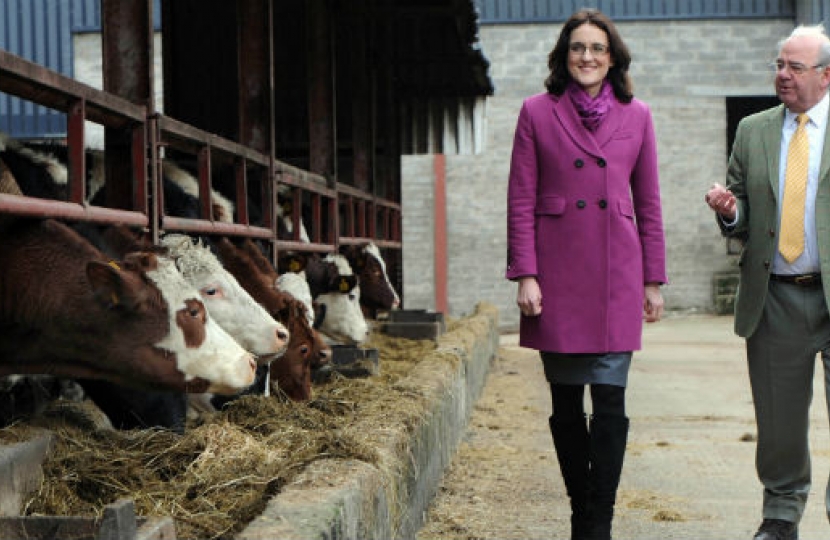
Conservative Home have recently published this article on food security and trade, written by Theresa Villiers...
The Covid-19 crisis has provided a stark reminder of how important food security is to every man, woman and child in this country. Thankfully the situation in our supermarkets and grocery shops appears to have calmed down as the majority of people start to listen to appeal that they only buy as much as they need for their regular shop.
But there are some longer term lessons to be learned from this emergency as we embark on this country’s first independent trade negotiations for half a century.
At present, around 60% of the food we eat in the UK is produced here. Ensuring continued access through Dover for the 40% which isn’t was the subject of painstaking planning in the run-up to a possible no-deal exit from the EU (and thankfully there is no reason to believe that those supply routes are in jeopardy in the current emergency).
It is also the case that trade liberalisation and increasing specialisation of various types of production in different parts of the world have, as economic theorists like David Ricardo predicted, brought huge benefits in terms of lower prices, more choice for consumers and greater overall prosperity.
But the complexity of the supply chains to which this globalisation trend inevitably leads does come with risks, especially when the fragility of our highly integrated global economy is highlighted by external shocks like Covid-19.
We can manage those risks for products like phones, cars, clothing etc. Indeed we should seek to go further and achieve greater liberalisation of trade in manufactured goods and in services; so we reap even more of those Ricardian benefits and see standards of living rise as a result.
But food is different. There are people (some of them close to Government) willing to accept complete liberalisation of trade in agriculture, and the removal of the tariffs which currently apply on food imports to the UK via the EU’s Common External Tariff. This, they would argue, is a price worth paying for a big trade deal. That approach is wrong. This is a point I made strongly when I was Environment Secretary.
There is a case for a degree of liberalisation in agriculture, for example in relation to food which we do not produce in this country. But we should be very cautious before we start reducing tariffs in sensitive sectors such as beef, lamb, poultry and dairy. In my view, we should make any such reductions conditional on meeting standards of food safety, animal welfare and environmental protection which are as good as our own.
More or less every country in the world treats food production as a special case when it comes to its trade policy. That is for the good reason that one of the first duties of Government is to ensure its population can buy the food they need, produced according to regulations which secure safety and hygiene. It is notoriously the case that agriculture is always the last and most difficult chapter to close in any trade negotiation.
The casual assumption of the free trade purists that removal of tariffs on food would simply mean buying our beef and chicken from low cost producers in the US is misguided. Offshoring food production to countries far away generates serious risks when a crisis hits. It is Covid this year but who knows what other adversity we might face in the future?
I would argue that our goal should be to increase the proportion of food we consume which is grown domestically, not reduce it.
The advantages of liberalisation of trade in agricultural produce in terms of price reductions for consumers are limited. Most would notice very little in terms of the cost of their weekly shop. But the disadvantages are very significant.
US producers are allowed to use intensive farming methods which would be unlawful in this country because of the tough rules and animal welfare with which we require our farmers to comply. While the science is disputed on the vexed question of chlorinated chicken, there is genuine anxiety that using a wash at the end of production can mask poor hygiene during the rearing of poultry, allowing producers to pack in birds so closely together that this would violate the rules on animal welfare which apply here. That I why I believe the ban on such imports which is currently on the statute book should stay in place.
Exposing our upland farmers to competition from imports produced to lower levels of animal welfare means there is a risk they would be undercut and many would find it hard to stay in business.
That would have severe consequences for the rural economy. Widespread bankruptcies in farming would also have a major negative impact on the stewardship of the countryside. And they would put pressure on the Union of the United Kingdom because of the centrality of livestock farming to communities in Scotland, Wales and Northern Ireland. The shock would be felt in the north of England too.
We are already asking a great deal of farmers as we change farm support radically and move to a system which secures environmental goals via the principle of ‘public money for public goods’. It is right that we pursue this reform, but it does mean that farmers will need to change the way they operate and some may not get as much money as they do under the CAP.
Farmers will face even greater challenges if the negotiations with the EU don’t initially result in a free trade agreement. I have every confidence that there will be such an agreement, but it may take time. Securing it prior to the end of the transition period is by no means certain. A no-FTA relationship with the EU would mean lamb exporters to the EU would face a tariff of around 67%, and the highest tariff on beef could be over 80%. If you add in unfettered competition from US producers, that would be a hit which many livestock businesses would not survive.
Moreover, the Conservatives were elected on a manifesto which contains commitments which are more far reaching on animal welfare and the environment than any before in the long history of our party. There is little point imposing tough regulations at home if you allow unrestricted imports into your country produced in jurisdictions with weaker rules. That means offshoring carbon emissions and animal cruelty not reducing them. If the Conservatives are to be taken seriously on our promises on the environment and on decent treatment of animals, then this must be reflected in our trade policy.
At times of fear and insecurity like this, we should all be conscious of the profound debt of gratitude that we owe to our farmers who go out in all weathers, 365 days of the year, to keep food on our tables. We should be proud that they produce the highest quality food to the most rigorous standards in the world on safety, animal welfare and respect for the environment.
And we should also remember that animal welfare is not just a sentimental concern of the kind-hearted, it has a real-world impact. Food safety and compassionate treatment of animals go hand-in-hand, as previous food scandals have demonstrated.
Whilst it may be years before we know with any certainty what caused the Coronavirus outbreak, the most likely explanation appears to be poor hygiene practices at live animal market in Wuhan. If even basic standards of animal welfare had been respected there, the world might not now be grappling with this cruel disease which is cutting short so many lives.


